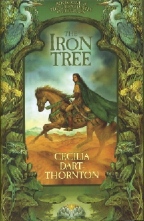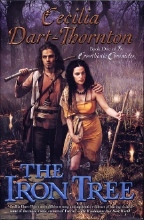The Iron Tree
Tor / Pan Macmillan
UK Hardback
ISBN 1-4050-4710-0
Publication Date: 19-11-2004
425; £17.99
Date Reviewed: 7-12-2004
Reviewed by: Stephanie Cage © 2004
|

|
The Iron Tree
Tor
US Hardback
ISBN 1-765-31205-0
Publication Date: 02-15-2005
400 Pages; $23.99
Date Reviewed: 7-12-2004
Reviewed by: Stephanie Cage © 2004 |
|
|
REFERENCES
|
COLUMNS
|
|
Fantasy
|
|
In 'The Iron Tree' (Book One of the Crowthistle Chronicles),
Cecilia Dart-Thornton draws on an impressively wide range of
influences from fairytale and folklore, including folk tales from
Yorkshire, Lancashire, Ireland and the Fens, as well as a smattering
of Norse legend. (A word of warning here: the references at the back
of the book, while fascinating, contain something of a plot spoiler,
so stay away from them until after finishing the story.) One of the
book's most extraordinary features is its vivid depiction of a whole
host of supernatural apparitions, from spectral riders in the desert
to weeping maidens in the marshes.
Dart-Thornton convincingly evokes a society used to coexisting
with magical creatures, spells and sorcery. When we first meet
Jarred, the book's attractive and intrepid hero, he is agonising over
the use of a protective amulet, which is one of his few ties to his
dead father. He's been told it bestows invulnerability on the wearer
- a useful trait when the land you are travelling is beset with
half-human bandits known as 'Marauders' as well as various 'eldritch
wights', both 'seelie' (benign or even helpful) and 'unseelie'
(malicious). Jarred would prefer a fair fight without supernatural
protection, but ultimately his promise to his dead father carries
more weight than the pricking of his conscience, and the amulet stays
on.
Determined to prove himself the equal of his unprotected friends,
he takes on all the dangerous tasks. Initially, in the safety of his
village home, these are fairly insignificant, such as retrieving a
telescope from the desert before its absence is missed. However, when
he sets off with a group of village lads on a quest to see the world
and learn more of his dead father, they encounter ever more dramatic
dangers.
They also encounter Lilith, an innocent beauty with a sword of
Damocles hanging over her in the form of the madness which afflicted
her grandfather and her mother, and which her family are beginning to
suspect may be inherited. The portrayal of the mad grandfather is
delightful, and seems to owe a great deal to Hamlet in his mad phase.
The grandfather doesn't quite mention hawks and handsaws, but 'they
say the conger is a candle-maker's daughter' is surely the Marsh
equivalent of 'they say the owl is the baker's daughter.' Lilith and
her mother recall Ophelia in their bewildered helplessness in the
face of madness, as well as their love of wild flowers, which brings
to mind Millais' Ophelia.
Not surprisingly, Jarred falls instantly in love with the
beautiful Lilith and eventually finds himself adopting a new quest:
to find out the origins and cure of her family's affliction. In the
course of his two quests, Jarred learns something of the truth about
his family origins, but the information soon puts both him and his
beloved in further jeopardy, leading to an extraordinary but
believable series of adventures.
The city lowlifes to whom he turns for assistance are also
well-drawn, with a very Shakespearean blend of caricature and pathos.
Fionnuala, in particular, both touches and repels the reader with her
mixture of genuine devotion and sheer selfishness.
The romance of Jarred and Lilith is a complicated story, summed up
by the narrator in the Prologue as:
'A chronicle of jealousy and revenge, of wickedness and justice,
and of love. It is an extraordinary tale, extraordinary and tragic;
yet there is no tragedy from which some goodness doth not arise, as
the green shoot doth sprout from the cold ashes of the wildfire.'
Thankfully, the verbose narrator then disappears until the
Epilogue, where he makes a brief appearance, which demonstrates that
tragedians weeping at their own stories are every bit as annoying as
comedians laughing at their own jokes.
Prologue and Epilogue aside, Dart-Thornton achieves a largely
convincing pseudo-medieval style. Poetic descriptions (somewhat
reminiscent of Keats, whose poem 'St Agnes' Eve' was an inspiration
for some aspects of the book) coexist comfortably with everyday
actions in passages such as this:
"In the western skies the sun was liquefying in rivers of
iridescent pink and gold, the usual splendour of a desert sunset, by
the time the boys finished devising and practising their tactics for
winning the football game."
However, the peppering of archaisms like 'naught' and 'gramercie'
occasionally becomes irritating, as do linguistic tics like the
characters' continual use of the phrase 'The knowledge is not at me,'
which by the end of the book left me yearning for a simple 'I don't
know'.
If 'The Iron Tree' has a fault, it is the impression it sometimes
gives that the author is trying too hard. All the ingredients of
great epic fantasy are here: evil sorcerers, curses, ghosts, amulets,
magic jewels, a powerful hero and a helpless heroine, described in
flowing poetic language. This has the unfortunate result that at
times the book seems to have been written by following a recipe for a
fantasy bestseller. First catch your wizard...

